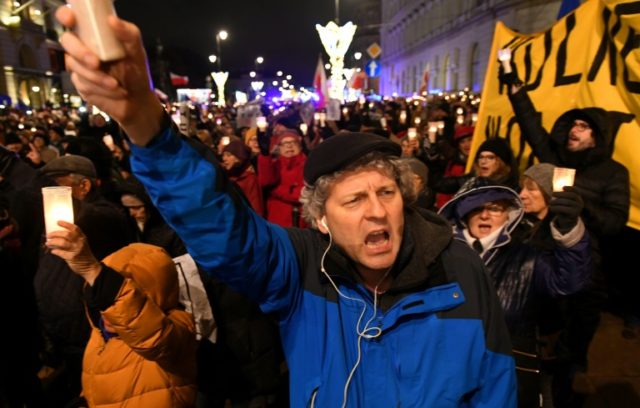Warsaw (AFP) – Poland’s conservative Law and Justice (PiS) party on Tuesday moved closer towards controlling the EU member’s justice system by having its own candidates elected to a body overseeing judicial impartiality.
The entire centrist opposition in the PiS-controlled parliament boycotted the vote on new members of the National Council of the Judiciary (KRS), which followed new legislation denounced as unconstitutional by critics at home and abroad.
The legislation passed last year gives parliament the power to choose the 15 members of the KRS, where previously they were chosen by fellow judges.
Backed by the Kukiz ’15 anti-establishment movement, PiS lawmakers on Tuesday approved their own list of judges to replace current KRS members who had been elected by judicial circles.
The rightwing PiS government says the measure, like other reforms it has been making since coming to power in late 2015, is necessary to combat corruption and overhaul a judicial system still haunted by the communist era.
But one of the outgoing KRS judges, Waldemar Zurek, denounced the reforms as “frightening”, saying “all these laws are changing the Constitution without the necessary constitutional majority.”
He also voiced concern over a planned disciplinary arm of the KRS that he believes “will have the goal of carrying out the dirty work of getting rid of insubordinate judges.”
The opposition had refused to present its own candidates or to take part in the vote because it believes the new form of electing KRS membership subjects the watchdog to political power.
“Instead of an independent KRS, what we actually have is the end of the separation of powers,” said Borys Budka, a former justice minister and member of the Civic Platform (PO) opposition party.
National lawyer associations had also called on their members to refrain from applying to the new KRS.
The PiS has also introduced changes affecting the Constitutional Court, the Supreme Court and the common courts. The reforms have plunged Poland into a political crisis and drawn concern from Brussels over the rule of law.
In December, the European Commission launched unprecedented disciplinary proceedings against Poland over the reforms, which can eventually lead to the “nuclear option” of the suspension of a country’s voting rights within the bloc.

COMMENTS
Please let us know if you're having issues with commenting.